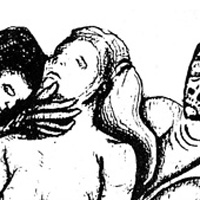El Dopa
by Liz Starbuck
At one of Think Tree‘s last shows, the band’s singer, Peter Moore, announced sardonically that their record label had dropped them because they were “toooo straaaange.” When they broke up a few months later, a lot of people who had found them just strange enough were emphatically disappointed, present company included.
When el Dopa played their first show at the former Causeway (the Causewas?), I kept repeating to myself, “I had no idea, no idea!” In Think Tree, Krishna was in the back, almost entirely surrounded with, well, stuff, electronic stuff. As a front man, he is an extremely interesting, almost hypnotic performer, and his lyrics can be as complex and quirky as Peter’s were in Think Tree. The funky, hip-hop thing el Dopa does serves them well; when they really push toward a complicated, multi-layered style, they occupy both your mind and your feet. Sometimes the music can be kind of average and then it’s too easy to stop paying attention and miss out on how interesting the lyrics are. A high point at both of the shows I saw was “I’m Not Sammy,” a song about a homeless woman at a bus stop who decides that Krishna is her long-lost brother. Less complex stylistically but very catchy, “People We Trust,” brings the talents of Danny Lee on drums into a different, funkier, style at which he excels.
Bongo Fury, Peter Moore’s spoken word project, comes across better in a small venue. Moore is truly amazing if no one’s spilling beer on you and you can really concentrate on him. (Bongo Fury seems to be making an impact, however, because at their most recent show it seemed that beer-spilling was temporarily suspended during their set. Now. there’s an accomplishment.) Even more so than in Think Tree, Moore’s many voices and roles are distinguished by his remarkable ease at slipping into different body languages.
The lyrics are just plain bizarre and they catch you off guard every time. The pieces that work the best are the less free-form ones; where Moore establishes a strict rhyme and rhythm and then sticks to it so rigorously that a lot of great silly word plays result.
The poem/song, “Pearl Jam Bought My Hair,” is a real crowd pleaser for obvious reasons, especially when Moore takes off at the end with an Eddie Vedder imitation which ironically makes you realize what a versatile singer Moore is and Vedder is not. I also particularly like the reasoning he uses to come to the conclusion that Grace Slick should be made into a hat.
In “Never Will,” at least three very distinct characters interact in Moore, and the imagery is vivid and perverse: “She’s a dance floor on the desert of a serpentine spleen, sliding smoothly like a bedpost from a rapture unrehearsed.” Will Ragano’s guitar travels a path along a treacherous psyche that feels like a cowboy movie made by Alfred Hitchcock.
“Girl on the Screen,” performed by Moore in one of his signature redneck alter-egos, got an interested reception, but surprisingly, the audience wasn’t as roused as I would have expected. “I need you bland and perfect, like the girl on the screen,” Moore intones, “…squeeze your tight skirt at me, cuz that means that I’m great. Give me high heels, flimsy, cuz your strength’s what I hate… I need you blue eyed perfect, like the hot magazine. I need you dumb and perfect – Can you stay seventeen? … Undulate in that movie – Can I watch you get laid?” It’s not clear whether the audience is simply unmoved by the media sexism Moore points out, or if they’re wary of how the lyric borders oh-so-delicately on politically correct moralism.



